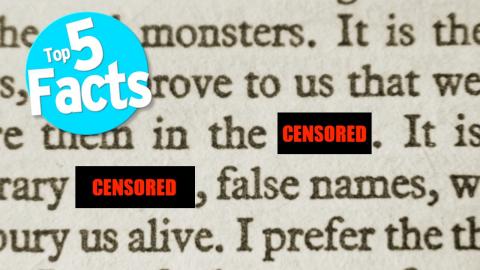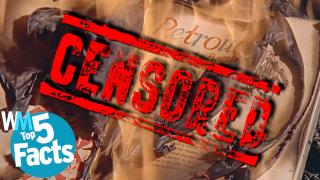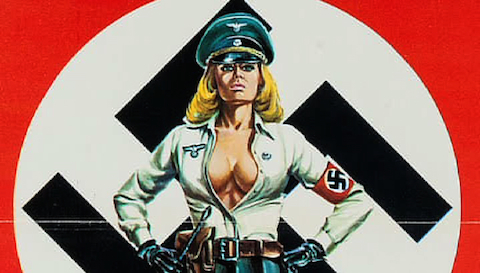Top 5 Facts About Censorship

Let's get this irony out of the way right off the top: Not censored Censored as f**k , Not censored ] F**king censored as f** . Yeah, it's ironic, and no, we don't understand it either, but there you go. Welcome to WatchMojo's Top 5 Facts. For this instalment, we're going to choose our words very carefully while we count down the five most interesting, and sometimes disconcerting facts about censorship. So dim the lights and make sure no one's listening.
Special thanks to our user AXHP for submitting the idea using our interactive suggestion tool at http://www.WatchMojo.comsuggest
WM Facts: Top 5 Facts about Censorship
Top 10 Most Disturbing Looney Tunes Facts
Let’s get this irony out of the way right off the top: Not censored Censored as f**k , Not censored ] F**king censored as f** . Yeah, it’s ironic, and no, we don’t understand it either, but there you go. Welcome to WatchMojo’s Top 5 Facts. For this instalment, we’re going to choose our words very carefully while we count down the five most interesting, and sometimes disconcerting facts about censorship. So dim the lights and make sure no one’s listening!
#5: The Catholic Church Banned Books for 400 Years
Top 5 Facts About Banned Literature
The Index Librorum Prohibitorum, the List of Prohibited Books, was a publication by the Catholic church started in 1559 by Pope Paul IV. For hundreds of years, the church had conflicts about what should be published by the church as part of their doctrine, but this was the beginning of the church censoring public works. Once on the list, authors could defend themselves, but ultimately, if they wanted their works published, they were forced into revising their work. The list was composed of work from many fields, such as astronomy, philosophy, and literature from some of the greatest minds of all time, including Johannes Kepler, John Locke, and Voltaire. It was finally abolished in 1965 by Pope Paul VI, though the church still suggest works about religious canon be “reviewed”.
#4: Nazis May Have Censored Films in Hollywood
Top 10 Fictional Movie Nazis
In his book “The Collaboration: Hollywood’s Pact with Hitler,” Ben Urwand, a junior fellow at Harvard, has unearthed what he asserts is some unsavory collaboration between major American film studios and the Nazi party in the 1930s and 40s, though some critics dispute his strongly worded claims. In 1933, Hitler’s government appointed diplomat Georg Gyssling to Los Angeles so he could fervently protest any film that criticized the Nazi party. Though he appeared to have no official authority, film studios were known to bend to his will. Movies that seemed sympathetic to Jewish people were revised and in at least one instance, even the word “Jew” was removed completely from dialogue. The 1937 picture “The Lancer Spy” was dropped entirely after Gyssling decried the depiction of German officials.
#3: Romans Invented Censors
Romans gave us the census, but these head-counters also had another sinister task: regimen morum, or “keeping public morals”. Not only were Roman censors in charge of recording the status of the nation’s peoples, they were also in charge of deciding whether or not they deserved to be considered citizens with all of the rights that would entail. Their responsibility was to enforce Roman character and ethic, entirely as they saw fit, regardless of if an actual law was broken or not. Part of their job was to put physical marks on the bodies of offenders… Kind of like modern censors, actually.
#2: Censorship on Social Media Could Threaten Freedom of Speech
According to Pew Research Center, more than 60% of Americans rely on social media as their primary source for news. On the one hand, that’s great because reputable news organizations can use Facebook, for instance, as a platform to reach a wider audience. But the downside, as the Columbia Journalism Review recently pointed out, is that they have to play by Facebook’s censorship rules, as opposed simply the laws of the land. Filmmakers, political cartoonists, and journalists have all reported instances where their controversial messages were removed from social media platforms without explanation. YouTube has even gone so far team up with governments to give them an expedited censorship process on their platform, as they did in Pakistan. The potential problem in all this is that making corporate entities de facto gatekeepers to information can seriously hamper the effectiveness of a free and independent media, which is essential for a democratic society.
#1: The Chinese Government Internet Censorship Masters
Top 5 Facts About the Tiananmen Square Protests
Iran may have recently been named number one in Internet censorship, but there’s just something about how the Chinese do it. With over 700 million Internet users in the country, censoring them is a daunting task, so they’ve invented some ingenious tools to get the job done. The “Great Firewall of China” is maintained by 30,000 government officers who monitor all online activity using special programs that log all keystrokes, even those in private chats or online games. Not only are many social media websites and blogs blocked, but search engines are filtered and will not offer results on keywords the government has prohibited. Though there are always ways around these obstacles, breaking Chinese censorship laws could result in fines of nearly $2,000 or jail time for serious offenses. So, how about you? Would you risk imprisonment to fight for your freedom of speech? And have you ever been censored unfairly on social media? For more state-glorifying top 10s and good-bits-blurred-out top 5s, be sure to subscribe to WatchMojo.com.





